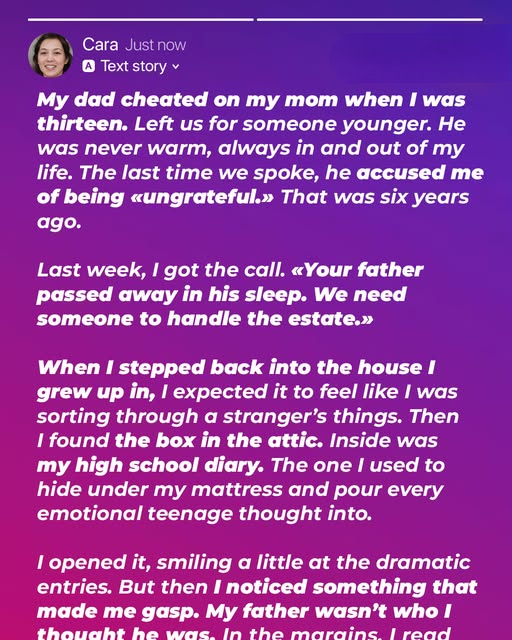
Cara hadn’t spoken to her father, Philip, in six years when she received the call that he had passed away in his sleep. She wasn’t grieving—just numb. Their relationship had been distant for years, marked by emotional absence more than presence.
She returned to his house not out of love, but obligation—to settle his estate and pack up a life they had long stopped sharing.
The house was exactly as she remembered it: frozen in time, filled with dust, old shoes, and forgotten coffee mugs. As she moved through rooms like a stranger, Cara felt nothing but detachment.
Until she reached the attic.
There, tucked inside a box labeled *“Books/Trophies/Random Items,” she found something unexpected: her high school diary.
Its navy-blue cover was worn, stickers peeling, pages frayed. She almost left it behind—until curiosity got the better of her.
Opening it felt like stepping into another version of herself—the teenage girl who struggled with self-worth, who wrote about failing tests, hating her body, and feeling invisible to the people who were supposed to love her most.
But then she saw them.
Notes in the margins.
Not hers.
His.
Her father’s handwriting—blocky, careful, unmistakable—was scribbled beside her words like he had answered her pain from across the years.
“You are not unlovable, Cara. Not even close.”
“One test doesn’t define you. I’m proud of how hard you try.”
“You don’t need to shrink to be worthy.”
Tears welled in her eyes before she could stop them.
He had read this. Not just once—but repeatedly. The ink wasn’t fresh, but it wasn’t old either. These weren’t rushed notes. They were written with care, with regret, maybe even with love he never knew how to say aloud.
Page after page, she read his silent apologies. His admissions of being a bad father. His wish for forgiveness.
At the back of the diary, she found an unfinished entry she had written during graduation week—angry, lost, full of hurt.
And beneath it, Philip had responded:
“I wish I had said these things when they mattered most.”
“I was a bad father, Cara. You didn’t deserve the silence.”
“This was the only way I could talk to you without you turning away. I hope someday, you’ll forgive me.”
The weight of those words crushed her harder than any argument or goodbye ever had.
She sat cross-legged on the attic floor, letting the truth settle between them—too late for reconciliation, but enough to change everything she thought she knew.
Philip had known.
He had seen her pain. Her distance. Her anger.
And he had carried guilt until the end.
That night, as she boxed up his belongings, she placed a sticky note on his desk:
“I read every word. I heard you.”
Then she whispered the words she never thought she’d say again:
“Goodbye, Dad.”
A month later, the house was sold. Grief still lingered, but so did clarity.
One afternoon, she visited his grave—not because she felt obligated, but because she needed to.
Beside her on the passenger seat was a bouquet of wildflowers and the diary.
As she knelt by the headstone, she told him about her new apartment, her life, and her godson. About how she still caught herself wishing they had tried harder—sooner.
“I didn’t come to your funeral,” she admitted, voice cracking. “I didn’t know what to say. But I’m here now.”
And for the first time, saying goodbye didn’t feel bitter.
It felt like release.
Because sometimes, healing doesn’t come from face-to-face conversations.
Sometimes, it comes from the margins of a book you thought was closed forever.